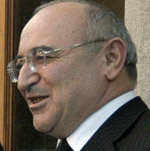Seiran Avagyan, an advisor to the RA president, is currently actively involved in solving problems concerning the system of local government. During a seminar at the “Congress” hotel of Yerevan dedicated to “European local government experience”, Seiran Avagyan said that Armenia is more developed than the neighboring countries, however, it is not enough and that the country still has a lot to do. There are many laws adopted to improve the local government system, however, we should assure that those laws are applied well. The “RA law on local government officers” has already been approved and about 7000 officers are going to be trained and pass tests.
The participants also discussed the status of Yerevan. S. Avagyan said that the new Constitution defines Yerevan as a community, thus the problem is easier to solve now. There was a time when many politicians argued during the constitutional amendments referendum campaign that Yerevan should be given the status of a community. It seemed that the future of Yerevan depended on that status. A year has passed since the constitutional referendum. I wonder whether there are any new law provisions that were adopted during this year concerning the issue. I wonder whether they have done anything to define the methods of electing the mayor directly or indirectly. To this question Seiran Avagyan replied that the amendments of the constitution allowed to do that for two years and added that the parties involved were discussing the issue at hand. While we were trying to tell the president’s advisor that we didn’t know anything about such discussions, Avagyan interrupted us and said that he was surprised at the fact that the press hadn’t covered that information. However, they didn’t answer to our question concerning the issue of electing the mayor.
Vahan Movsisyan, head of the union of communities in charge of finances, spoke about the achievements of our country regarding the system of local government and the current issues, especially finances. “When I read the law on reimbursing the income of communities it seems to me that it is adopted not for our country, but for other countries”, said V. Movsisyan. The problem is the fact that according to the current legislation, money taken out of the budget should reimburse the negative balance of community expenses if the given community is not able to cover its expenses, however, it can only be given in three years. According to V. Movsisyan, the worst thing is the fact that after amending the mentioned law the reimbursement, which is to be given, will be given from the 4% share of the budget subsidy, which should be spent in communities too regardless of anything.
The main topic during the seminar concerned small communities. Seiran Avagyan said that Armenia has broken the community governments to small pieces. “There are 930 local governments in Armenia, meanwhile there are only 64 local governments in Latvia”, said Seiran Avagyan. The participants said that it is not effective to have so many small communities since most of them are not able to self-govern effectively. V. Movsisyan says that there are three communities in Armenia and together they have 50 citizens. Most of the Armenian communities have less than 1000 citizens.
The participants proposed a solution to found inter-community units. The new Constitution allows that. In other words, they suggested uniting the small communities. V. Movsisyan said that, for example, a community with 350 citizens could join its neighboring city Kapan that had 65 thousand citizens. One of the participants, Sos Gimishyan said that the community heads would not like that idea since it is easier for them not to do anything, take money and give a part of it to officials to be elected again. However, Mr. Gimishyan said that it is not important to unite and enlarge communities, i.e. it is more important to give enough money to communities and supervise the work that they are doing. “There are 5000 communities in the Czech Republic and they work well. If we punish some of them for not doing their work well, we will know what the problem is” said S. Gimishyan.
However, S. Avagyan said that they had already started work on reforming the local government systems and hoped that the law would be adopted by the end of the year. The only problem is that they don’t know what to do in order to make that reformation process easier for the communities that are “being enlarged”. “Communities are happy to be given rights, but as soon as you want to take some rights from them, they may not agree with you”, said S. Avagyan.
V. Movsisyan proposed another solution too and said that the government could offer those communities to build new roads and schools after enlarging them; in addition, he noted that the government did not have enough money for that.
The best solution is to unite the communities and be enlarged. If some of the current communities don’t agree to join another community, the government may stop them from working as a local government body and hand that responsibility over to the regional administration boards. The participants said that many European countries had done that.
“Finally, we are not making reforms for the sake of the community heads, but for accountants and community citizens. Children are not to blame for being born in small village communities where there are no schools and other institutions,”, said V. Movsisyan.
By enlarging communities the government will save money since it will not have to give money to small communities any more. S. Avagyan said that the purpose of the mentioned reformation was to improve the local government system and make it more effective for management in Armenia.

